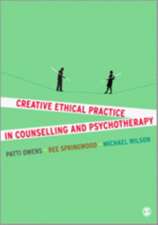Gestalt Therapy: History, Theory, and Practice
Autor Ansel L. Woldt, Sarah M. Tomanen Limba Engleză Paperback – 8 mar 2005
'Ansel L. Woldt and Sarah M. Toman have put together a monumental text that fills a gap in the genre of serious Gestalt literature that has remained relatively empty since Perls, Hefferline, and Goodman's Gestalt Therapy was published in 1951. This is not to say that there haven't been extraordinary works in this field published since then; however, this is one of the most expansive books of the recent collection. Each of the chapter authors has written impressive selections that, taken one-by-one, are valuable additions for serious students and practitioners. What earns this book an evaluation as extraordinary is both the content and the structure' - J. Edward Lynch, Southern Connecticut State University
Gestalt Therapy: History, Theory, and Practice is a basic, introductory text, written by major Gestalt theorists, that will engage those new to Gestalt therapy. Editors Ansel Woldt and Sarah M. Toman introduce the historical underpinnings and fundamental concepts of Gestalt therapy and illustrate applications of those concepts to therapeutic practice. The book is a unique contribution to the field in that it is the first Gestalt textbook specifically designed for the academic and training institute settings. Gestalt Therapy takes both a conceptual and a practical approach to examining classic and cutting-edge constructs. In each chapter, understanding of concepts proceeds from content to case applications to experiential exercises.
Key features include:
- Two parts covering background, theory, and methodology in Part I and examining the applications of Gestalt therapy in Part II
- Chapters written by theorists and practitioners who are experts in various aspects of Gestalt therapy
- "Dialogue Boxes" running alongside the content, mirroring a key Gestalt concept of valuing multiple perspectives and voices
- Guidance on training resources, Gestalt Internet resources, and Gestalt organizations
Gestalt Therapy is designed for graduate students studying mental health, as well as for trainees at the many Gestalt training institutes around the world.
Preț: 1086.48 lei
Preț vechi: 1488.32 lei
-27% Nou
Puncte Express: 1630
Preț estimativ în valută:
207.92€ • 215.76$ • 173.79£
207.92€ • 215.76$ • 173.79£
Carte tipărită la comandă
Livrare economică 15-29 martie
Preluare comenzi: 021 569.72.76
Specificații
ISBN-13: 9780761927914
ISBN-10: 0761927913
Pagini: 424
Ilustrații: Illustrations
Dimensiuni: 187 x 232 x 22 mm
Greutate: 0.69 kg
Ediția:New.
Editura: SAGE Publications
Colecția Sage Publications, Inc
Locul publicării:Thousand Oaks, United States
ISBN-10: 0761927913
Pagini: 424
Ilustrații: Illustrations
Dimensiuni: 187 x 232 x 22 mm
Greutate: 0.69 kg
Ediția:New.
Editura: SAGE Publications
Colecția Sage Publications, Inc
Locul publicării:Thousand Oaks, United States
Recenzii
"This is an incredibly important addition to the world of psychotherapy and Gestalt, in particular. This book will be very helpful for use with various courses of study, not just Gestalt institutes and special training programs, but also general graduate school classes in masters programs for mental health, social work, counseling, allied health professionals, psychiatry, and psychology. I highly recommend this book. I think it will make an excellent contribution."
"Ansel L. Woldt and Sarah M. Toman have put together a monumental text that fills a gap in the genre of serious Gestalt literature that has remained relatively empty since Perls, Hefferline, and Goodman's Gestalt Therapy was published in 1951. This is not to say that there haven't been extraordinary works in this field published since then; however, this is one of the most expansive books of the recent collection. Each of the chapter authors has written impressive selections that, taken one-by-one, are valuable additions for serious students and practitioners. What earns this book an evaluation as extraordinary is both the content and the structure."
"The format is intriguing, lively, and the 'dialogue' sections will allow other voices to speak because, as with all good theory, there is not unanimity regarding the nature and/or importance of various concepts."
"Ansel L. Woldt and Sarah M. Toman have put together a monumental text that fills a gap in the genre of serious Gestalt literature that has remained relatively empty since Perls, Hefferline, and Goodman's Gestalt Therapy was published in 1951. This is not to say that there haven't been extraordinary works in this field published since then; however, this is one of the most expansive books of the recent collection. Each of the chapter authors has written impressive selections that, taken one-by-one, are valuable additions for serious students and practitioners. What earns this book an evaluation as extraordinary is both the content and the structure."
"The format is intriguing, lively, and the 'dialogue' sections will allow other voices to speak because, as with all good theory, there is not unanimity regarding the nature and/or importance of various concepts."
Cuprins
ACKNOWLEDGEMENTS
PROLOGUE - FOREWORD
PRE-TEXT: GESTALT PEDAGOGY:
CREATING THE FIELD FOR TEACHING AND LEARNING - Ansel L. Woldt, Ed.D.
Dialogue Respondent - Sarah M. Toman, Ph.D.
PART I: FOUNDATIONS OF GESTALT THERAPY
Chapter 1. The History and Development of Gestalt Therapy - Charles E. Bowman, M.S.
Dialogue Respondent - Edwin C. Nevis, Ph.D.
Chapter 2. Classical Gestalt Therapy Theory - Margherita Spagnuolo Lobb, Psy.D.
Dialogue Respondent - Philip Lichtenberg, Ph.D.
Chapter 3. Contemporary Gestalt Therapy: Field - Malcolm Parlett, Ph.D.
Dialogue Respondent - Robert G. Lee, Ph.D.
Chapter 4. Phenomenology, Existentialism and Eastern Thought in Gestalt Therapy - Sylvia Fleming Crocker, Ph.D.
Dialogue Respondent - Peter Philippson, M.Sc.
Chapter 5. Gestalt Therapy Theory of Change - Gary Yontef, Ph.D., M.S.W., A.B.P.P.
Dialogue Respondent - Reinhard Fúhr, Ph.D.
Chapter 6. Gestalt Therapy Methodology - Joseph Melnick, Ph.D. & Sonia March Nevis, Ph.D.
Dialogue Respondent - Norman Shub, B.C.D.
Chapter 7. Cultural Influences and Considerations in Gestalt Therapy - Sabin Fernbacher, M.A.
Dialogue Respondent - Deborah Plummer, Ph.D.
Chapter 8. Spirituality in Gestalt Therapy - R. Elliott Ingersoll, Ph.D.
Dialogue Respondent - Brian O'Neill, M.A., Ps.S.
PART II: GESTALT APPLICATIONS WITH SPECIFIC POPULATIONS
Chapter 9. Gestalt Therapy with Children - Cynthia Reynolds, Ph.D.
Dialogue Respondent: - Peter Mortola, Ph.D.
Chapter 10. Adolescents: Development and Practice from a Gestalt Orientation - Sarah Toman, Ph.D., and Ann Bauer, Ph.D.
Dialogue Respondents - Mark McConville, Ph.D., & Bruce Robertson, M.S.W.
Chapter 11. Family and Couple Therapy from a Gestalt Perspective - J. Edward Lynch, Ph.D., and Barbara Lynch, Ph.D.
Dialogue Respondent - Joseph C. Zinker, Ph.D.
Chapter 12. Gestalt Therapy in Groups - Paul Schoenberg, Ph.D., and Bud Feder, Ph.D.
Dialogue Respondents - Jon Frew, Ph.D., & Irwin Gadol, Ph.D.
Chapter 13. Gestalt Approaches with Organizations and Large Systems - Rick Maurer, Ph.D.
Dialogue Respondent - Seán Gaffney, Ph.D.
Chapter 14. Gestalt Therapy in Community Mental Health - Philip Brownell, M.Div., Psy.D.
Dialogue Respondent - Karen Fleming, Ph.D.
Chapter 15. Gestalt Approaches to Substance Use/Abuse/Dependency: Theory and Practice - Michael Clemmens, Ph.D., M.S.W.
Dialogue Respondent - Helga Matzko, M.A., M.A., C.A.G.S.
Chapter 16. Gestalt Educational Therapy - Cara Garcia, Ph.D., Susan Baker, M.A., & Robert deMayo, Ph.D.
Dialogue Respondent - George I. Brown, Ph.D.
EPILOGUE - AFTERWORD
COMPREHENSIVE REFERENCE AND GESTALT BOOK LIST
APPENDIX
PROLOGUE - FOREWORD
PRE-TEXT: GESTALT PEDAGOGY:
CREATING THE FIELD FOR TEACHING AND LEARNING - Ansel L. Woldt, Ed.D.
Dialogue Respondent - Sarah M. Toman, Ph.D.
PART I: FOUNDATIONS OF GESTALT THERAPY
Chapter 1. The History and Development of Gestalt Therapy - Charles E. Bowman, M.S.
Dialogue Respondent - Edwin C. Nevis, Ph.D.
Chapter 2. Classical Gestalt Therapy Theory - Margherita Spagnuolo Lobb, Psy.D.
Dialogue Respondent - Philip Lichtenberg, Ph.D.
Chapter 3. Contemporary Gestalt Therapy: Field - Malcolm Parlett, Ph.D.
Dialogue Respondent - Robert G. Lee, Ph.D.
Chapter 4. Phenomenology, Existentialism and Eastern Thought in Gestalt Therapy - Sylvia Fleming Crocker, Ph.D.
Dialogue Respondent - Peter Philippson, M.Sc.
Chapter 5. Gestalt Therapy Theory of Change - Gary Yontef, Ph.D., M.S.W., A.B.P.P.
Dialogue Respondent - Reinhard Fúhr, Ph.D.
Chapter 6. Gestalt Therapy Methodology - Joseph Melnick, Ph.D. & Sonia March Nevis, Ph.D.
Dialogue Respondent - Norman Shub, B.C.D.
Chapter 7. Cultural Influences and Considerations in Gestalt Therapy - Sabin Fernbacher, M.A.
Dialogue Respondent - Deborah Plummer, Ph.D.
Chapter 8. Spirituality in Gestalt Therapy - R. Elliott Ingersoll, Ph.D.
Dialogue Respondent - Brian O'Neill, M.A., Ps.S.
PART II: GESTALT APPLICATIONS WITH SPECIFIC POPULATIONS
Chapter 9. Gestalt Therapy with Children - Cynthia Reynolds, Ph.D.
Dialogue Respondent: - Peter Mortola, Ph.D.
Chapter 10. Adolescents: Development and Practice from a Gestalt Orientation - Sarah Toman, Ph.D., and Ann Bauer, Ph.D.
Dialogue Respondents - Mark McConville, Ph.D., & Bruce Robertson, M.S.W.
Chapter 11. Family and Couple Therapy from a Gestalt Perspective - J. Edward Lynch, Ph.D., and Barbara Lynch, Ph.D.
Dialogue Respondent - Joseph C. Zinker, Ph.D.
Chapter 12. Gestalt Therapy in Groups - Paul Schoenberg, Ph.D., and Bud Feder, Ph.D.
Dialogue Respondents - Jon Frew, Ph.D., & Irwin Gadol, Ph.D.
Chapter 13. Gestalt Approaches with Organizations and Large Systems - Rick Maurer, Ph.D.
Dialogue Respondent - Seán Gaffney, Ph.D.
Chapter 14. Gestalt Therapy in Community Mental Health - Philip Brownell, M.Div., Psy.D.
Dialogue Respondent - Karen Fleming, Ph.D.
Chapter 15. Gestalt Approaches to Substance Use/Abuse/Dependency: Theory and Practice - Michael Clemmens, Ph.D., M.S.W.
Dialogue Respondent - Helga Matzko, M.A., M.A., C.A.G.S.
Chapter 16. Gestalt Educational Therapy - Cara Garcia, Ph.D., Susan Baker, M.A., & Robert deMayo, Ph.D.
Dialogue Respondent - George I. Brown, Ph.D.
EPILOGUE - AFTERWORD
COMPREHENSIVE REFERENCE AND GESTALT BOOK LIST
APPENDIX
Notă biografică
Ansel Woldt (Ed.D., Counseling Psychology, University of North Dakota, 1968) is Professor Emeritus of Counseling at Kent State University. Dr. Woldt has extensive experience in Gestalt teaching, research, editorial work, international organizational activity, and clinical practice dating back to the 1960s. He serves as Associate Editor for the Gestalt Review and was a primary founder of the Association for the Advancement of Gestalt Therapy, where he continues to hold the office of Archivist and Continuing Education Officer. He has directed over 100 doctoral dissertations, 45 relating to Gestalt therapy, and has taught an advanced graduate Gestalt Therapy course at Kent State for over 30 years. He founded and is primary collector for the Gestalt Therapy Archives at Kent State. As Continuing Education Associate for the Gestalt International Study Center at Cape Cod, Massachusetts, and as a presenter at major conferences, Dr. Woldt has ongoing contact and involvement with Gestalt therapists throughout the world.
Descriere
Gestalt Therapy: History, Theory, and Practice is an introductory text, written by major Gestalt theorists, that will engage those new to Gestalt therapy. Editors Ansel Woldt and Sarah M. Toman introduce the historical underpinnings and fundamental concepts of Gestalt therapy and illustrate applications of those concepts to therapeutic practice. The book is unique in that it is the first Gestalt text specifically designed for the academic and training institute settings. Gestalt Therapy takes both a conceptual and a practical approach to examining classic and cutting-edge constructs.













